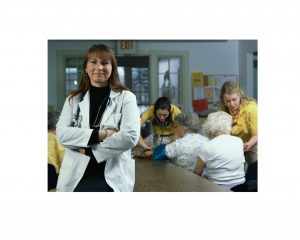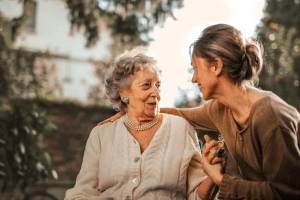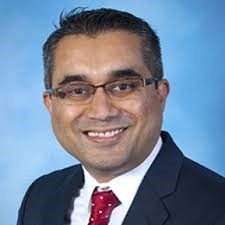Dr. Mauk’s Boomer Blog
Each week, Dr. Kristen Mauk shares thoughts relevant to Baby Boomers that are aimed to educate and amuse.
Dr. Kristen L. Mauk, PhD, DNP, RN, CRRN, GCNS-BC, GNP-BC, FAAN

Guest Blog:The Advantages Of Hiring A Home Care Consultant For Your Business
Hiring a home care consultant for your business can make a huge impact on the credibility
of the services you provide. Home care professionals are highly sought after by people who need help with caring for their aging loved ones. As a business owner, you can build authority as a home care provider and subject matter expert by collaborating with a consultant.
Of course, not just any consultant will work for your business and its home care goals. There are different skills you want to look for in the person that you hire. But the skills that you settle on will ultimately depend on your business size, the breadth of your services, and obviously, your bottom line. That’s why you’ll want to properly vet your potential home care consultants before you bring them onto your team.
In this article, we will cover the benefits of hiring a home care consultant for your business. We’ll also make sure you’re clear on what to look for in a candidate and their background. Read on
to discover how a home care consultant can positively impact your business and the home care services it provides.
You Decide What Background You’re Looking For
There is no one-size-fits-all background to look for when hiring a home care consultant. In fact,
It’s a common misconception that home care professionals need to all have extensive medical backgrounds. This is not at all the case, although some quality home care consultants may come from a health-related background.
If you want to take a deeper dive into your candidate’s background, you can get in touch with your local licensing board that certifies home care professionals. Many of these licensing boards, what they ask for from a person looking to become certified, and their criteria to meet change, based on what state you’re in.
Whatever your candidate’s background looks like, though, there are still some key things to look for above all else. These qualities will ultimately benefit your company and your clients’ experience with your services. Good communication, empathy, patience, and dedication — these are just a few attributes in a candidate that will make a huge impact on your clients. Interview your clients – multiple times, if you’d like – to make sure that they have these essential qualities.
You Can Build Relationships with Consultants
Simply put, it’s easier to build a relationship with someone on-one-one, rather than indirectly or through a third-party like home care staffing agencies. Home care consultants bring personal-level traits like loyalty and empathy, without the bureaucratic baggage and extra steps that you deal with when hiring through an agency. Building a relationship with a consultant early-on is a great way to get a sense of their experience and quality of service.
Once you’ve gotten to know a consultant well, it’ll be much easier to introduce them to your potential and existing clients. It’ll be obvious that you have a trusted relationship with your consultant when you can introduce them naturally while still providing a lot of detail about what they can offer.
Another advantage of working with an individual consultant is meting out more manageable pay. It tends to cost a lot more to hire home care consultants through an agency or other third party. Since you’re only negotiating pay and setting rates with one person, the time from sourcing candidates to hiring them is usually much quicker. Think carefully about how much you can budget for hiring home care professionals — chances are, a consultant will make much more sense for your business’s bottom line.
You Can Easily Evaluate Performance
The last thing that you want is for your home care services to suffer without you knowing about it. When you hire a home care consultant, it’s much easier to evaluate their performance and track their growth than it is when working with an agency. With a home care consultant, you can coordinate a performance tracker with them to make sure they know how to satisfy your business needs.
You can start this process during the hiring phase when you outline with your consultant what your requirements for their performance are. After your consultant understands what your business needs are and what your clients expect from them, they can closely work with you to make sure they’re meeting your expectations. Remember, if you’re not clear with your consultant about what’s required of them early on, they’ll struggle to meet your performance standards.
A huge benefit to setting a one-on-one performance plan and schedule with a consultant is reducing your risk of time lost. It’s much more difficult to plan performance expectations through an agency, evaluate them as having met your standards, and confirm with the person being cared for that they’re satisfied. With a consultant, your business doesn’t risk wasted time, effort, and money on a home care professional that isn’t on the same page as you.
It Helps Make a Name For Your Business and its Services
Hiring a home care consultant of your own simply gives your business more credibility than hiring through an agency. When you work with a consultant, you directly coordinate the way they behave with your client, which means you’re responsible for determining what your client needs are, and making sure they’re met one-hundred percent of the time. If you go with the agency route, you’ll never be sure that you’ll have the same caregiver for any real length of time, which hurts your clients’ overall experience.
Go with a home care consultant to increase your chances of having someone reliable who can stick around for the long haul. All too often, hiring through an agency means you’ll get a rotating door of individuals with varying levels of experience and skills.
A home care consultant with whom you build up trust and a relationship will make a world of difference in the quality of care your business offers in the longer-term. Your clients will recognize your business as a reliable source of expertise, rather than an outsourcing agency that doesn’t understand what its clients really want from their home care.
Guest Blog: Self-Care for Seniors: 4 Best Ways to Prioritize Your Health
The golden years come with their advantages. There’s the newfound freedom, for example, and the chance to relax and revel in all that you have accomplished. But your retirement years also bring age-related challenges that can really put a damper on enjoying them. It’s important for seniors to place high priority on their health and well-being, but it can be difficult to know where to begin. Here are four ways that you can place yourself first.
Social Well-Being
Although retirement usually includes the benefit of having more free time, having extra time on your hands can also have its disadvantages, especially if you live alone. Too much idle or alone time can lead to boredom, unhealthy inactivity, and even depression. Here a couple of activities to consider if you’re feeling isolated or unstimulated.
Get a part-time job
Finding a part-time job in retirement has its advantages. Not only will you have a little extra cash coming in, but you’ll meet new people and feel a sense of responsibility that you may be missing from your working years.
Senior Citizen Groups and Clubs
Joining and participating in senior groups, clubs, and organizations is often free or inexpensive, and some will even provide transportation. You can find groups that are general interest as well as others that focus on specific activities and niches.
Ensure Home Safety
Making sure that your home is a safe place to be is important for anyone, but it’s perhaps especially vital for seniors who are more at risk of falling as well as those who live alone. Here are four simple ways to make your home a safer place.
Bathing
Installing grab bars is one way to provide added safety when bathing. You can also invest in hands-free toiletry dispensers that save you the hassle of slippery bar soap or handling bulky containers.
Air Quality
It’s impossible to know exactly what toxins may be lurking in your household air, but there are steps you can take to reduce them. You can protect your home’s air quality by replacing air filters regularly and having your HVAC system checked by a repairman.
Natural Cleaning Products
Because of the current social awareness of toxins found in many cleaning and hygiene products, it has become easier to find brands that make products using only natural ingredients. You can also easily mix your own natural cleaning products using things like vinegar or lemon juice.
Maintain a Balanced Diet
There are a number of things that can hinder seniors from getting proper nutrition. These include a lack of transportation, dwindling finances, and medications that cause nausea or reduce appetites. It’s important for you to make healthy food choices at all ages. Try eating foods high in omega-3 fatty acids, calcium, and fiber, as well as drinking plenty of water.
Gentle Exercise
As a senior, it’s more important than ever to exercise regularly, and the good news is that you don’t have to put out a lot of effort. Just 30 minutes a day, 5 days a week will suffice. Walking, yoga, or swimming are gentle and effective forms of exercise for seniors. If you don’t have access to a pool at home and don’t have your own transportation, you may be able to find a senior swimming group similar to the ones discussed above that offers transportation. Then, your exercise regimen could include a social outlet as well.
Guest Blog: How Wearable Technology Can Benefit Your Health
It’s no surprise that in the digital age, in addition to apps and online services, wearable technology is paving the way for better health outcomes for people of all ages. What exactly is wearable technology? Essentially any portable device which you can wear on your person, like a necklace, pendant, bracelet, clip, and so on, that serves a technological function like syncing fitness and medical data to the cloud, or sending alert signals to call for help.
Wearable technology continues to evolve and benefit people’s physical and emotional health. Check out how in this quick guide:
Medical Alert Technology
If you have mobility issues, have been hospitalized or gone to the E.R. in the past year, or simply suffer from a condition where you may require fast access to emergency services (i.e. diabetes, Parkinson’s), you may be looking into getting a medical alert system. While stationary medical alert systems in your home are helpful, so are wearable medical alert accessories when you head out the door.
Portable medical alert accessories may range from pendants to clip-ons to bracelets and serve a variety of purposes. Often most affordable but most overlooked is the novelty medical alert bracelets which feature a metal plate engraved with your personal and health information including an emergency contact. More technologically-advanced bracelets, however, come equipped with a discreetly hidden USB drive that stores all your personal health information. Other medical alert accessories feature buttons, on a necklace, for example, that can be pushed to give off loud alarm sounds and ward off potential attackers or call someone for help.
Fitness
Wearable fitness trackers like Fitbit, Bellabeat, and Motiv Ring all continue to be popular accessories among younger generations, however, they have their place with the senior demographic too. A wearable fitness tracker is typically like a watch, pendant, or piece of jewelry you wear that can track important health data based on the activity of your body. More closely monitoring your physical activity can help you better achieve your fitness goals and maintain a healthy weight.
Important information like the number of steps you take in a day, your pulse rate, sleep patterns, calories burned, oxygen utilization, and fitness goals achieved can all be tracked these days with this type of advanced wearable technology. If you would rather not wear anything additional and simply take advantage of the smartphone you carry around in your pocket anyway, looking into the Health app(s) available to you via your phone’s operating system or app library. You can both enter personal health data in there as well as track physical activity and more.
Posture
Are poor posture habits a pain in your neck (literally)? While “sitting up straight” might seem like your only course of action, turns out there are technological solutions designed to help you as well. Apps like Perfect Posture and Posture Zone can be downloaded to your phone and customized to alert you (via vibrations in your pocket) when you are slumping or slouching.
Wearable accessories like Lumo Lift Posture Coach are even more discreet, lightweight solutions you wear near your collarbone. This posture coach tool uses biomechanical motion sensors to track both your activity levels as well as your posture during the day. If you start to slouch or crane your head and shoulders forward, it gently vibrates to alert you to fix your posture.
Why Choose an Eco-Friendly Senior Living Community
You might be looking for a senior living community, either for your folks or somewhere to retire when you’ve hit that advanced stage in life. It’s more than looking for a location that will be your new home, and you deserve nothing but the best.
Some of the criteria include great amenities, an accessible support system, and social opportunities that are especially for the seniors living in it. One option is to look for eco-friendly senior living communities, upgraded areas that are not just focused on reducing the carbon footprint of its area. Its all-around approach to sustainability means that it can give you and your family an improved quality of life. To better appreciate this fast-rising alternative, here are a few reasons why you should choose an eco-friendly senior living community:
Reduce plastic waste
Although plastic waste reduction sounds like a vague and wide problem, it actually affects each of us in ways we’re not even aware of. Studies have shown how certain chemicals in plastic packaging can leech into the food and beverages wrapped within. This poses health risks that are only magnified with age.
Generally, an eco-friendly senior living community sources its needs from socially and environmentally responsible sources. This includes the preferences toward organically grown produce often delivered from the farm straight to their doorstep. These are fruits and vegetables that reduce the use of plastics that not only pose risks of contaminating food but are also disposed of afterward after only being used once.
Additionally, most of these communities have proper waste management plans that invite their members to participate in. Knowing that your wastes, plastic or not, is handled and managed well, assures you that less of these materials end up in landfills or worse, the oceans.
Better energy efficiency
Most green senior living communities have implemented the use of alternative energy sources such as solar or wind. To be honest, these options are might appear discouraging in the form of higher upfront costs. However, remember that these investments pay for themselves in the long run. In fact, the costs of renewable energy sources have plunged over the years and are expected to go cheaper in the future. A study showed that 62% of these energy sources were cheaper than the cheapest form of conventional fossil fuel use.
Other energy-efficient and environmentally-friendly alternatives also benefit the seniors that live in them. Stable and consistent geothermal heating and cooling allows near-constant access to these utilities at a lower cost and computed, low-flow plumbing helps preserve water and makes for gentler showers. There are even indirect energy benefits to choosing an eco-friendly senior living community, such as its sustainable sourcing options meaning less energy used for transport, processing, and packaging of the foods they eat.
Safer and for the residents
There are senior living communities, and there are eco-friendly senior living communities. By choosing alternatives that are good for nature, these locations are basically healthier for the people in advanced age living in them. You’ve probably heard of natural paint, or eco-friendly paint for some, which contains significantly lower levels of volatile organic chemicals (VOCs). These compounds have an effect on the air quality surrounding them, especially in rooms where people might spend most of their time. The Environmental Protection Agency (EPA) has listed a number of short- and long-term health effects of these materials.
Aside from paints, the same applies to adhesives, sealants, and other substances used in finishing and furnishing houses. Also, you can expect these communities to make healthier choices in all aspects of lifestyle such as considerations on ventilation and air quality, and natural lighting for illumination. While these all sound like minor details, any of these factors could contribute to the difference between health and disease in an older individual.
Promote a healthier lifestyle
The human body is a complex machine made of too many parts, each of them requiring a specific level of care to maintain. As people age, they get weaker and require additional care to avoid any untoward events. Developers behind an eco-friendly senior living community are aware of this and try to provide as much encouragement and incentive as they can to get the seniors to move more.
In terms of encouraging physical activity, note how these locations have scattered green spaces all over the place instead of a singular area with trees. Additionally, there are roads intended only for walking or jogging, oftentimes bicycle lanes being separate. Also, a common amenities to this goal is the inclusion of regular exercise programs that not only invite the residents to exercise but also give them an opportunity to meet new people.
Conclusion
In looking for a senior living community, you deserve nothing but the best. Although it seems like the problems of the world are not our concern when looking for the perfect location, the benefits listed above show how our choices affect the environment and affect us in return. By going for an eco-friendly senior living community, not only do you help make the world a better place, but also provide the best option available.
What is COPD?
Background
COPD Chronic obstructive pulmonary disease (COPD) refers to a group of diseases resulting in airflow obstruction due to smoking, environmental exposures, and genetics. However, smoking is clearly the most common cause of COPD. The two disorders most commonly included under the umbrella of COPD are emphysema and chronic bronchitis. Although the disease mechanisms contributing to airflow obstruction is different in these two disorders, most patients demonstrate features of both emphysema and chronic bronchitis.
In 2008, the CDC recently released a report naming COPD as the third leading cause of death in the United States (National Vital Statistics Reports [NVVS], 2010). There are more than 12 million people in the United States U.S. diagnosed with COPD. However, due to the under diagnosis of the disease, only estimations of the prevalence of COPD are available, which suggest that approximately 24 million people are living with COPD (ALA, 2012). Slightly more females than males are affected, with female smokers having a 13 times greater chance of death from COPD than nonsmoking females (ALA, 2004).
Chronic Bronchitis
Chronic bronchitis is a common COPD among older adults. It results from recurrent inflammation and mucus production in the bronchial tubes. Repeated infections produce blockage from mucus and eventual scarring that restricts airflow. The American Lung Association (2012) stated that about 8.5 million Americans had been diagnosed with chronic bronchitis as of 2005. Females are twice as likely as males to have this problem.
Emphysema
Emphysema results when the alveoli in the lungs are irreversibly destroyed. As the lungs lose elasticity, air becomes trapped in the alveolar sacs, resulting in carbon dioxide retention and impaired gas exchange. More males than females are affected with emphysema, and most (91%) of the 3.8 million Americans with this disease are over the age of 45 (ALA, 2004).
Risk Factors
The major risk factor for COPD is smoking, which causes 80–90% of COPD deaths. Alpha-1-antitrypsin deficiency is a rare cause of COPD, but can be ruled out through blood tests. Although “COPD is almost 100% preventable by avoidance of smoking” (Kennedy-Malone et al., 2003), environmental factors play a strong role in the incidence of COPD. Approximately 19.2% of people with COPD can link the cause to work exposure, and 31.7% have never smoked (ALA, 2008).
Warning Signs
The signs and symptoms of chronic bronchitis include increased mucus production, shortness of breath, wheezing, decreased breath sounds, and chronic productive cough. Chronic bronchitis can lead to emphysema. Signs and symptoms of emphysema include shortness of breath, decreased exercise tolerance, and cough.
Diagnosis
Persons with COPD often experience a decrease in quality of life as the disease progresses. The shortness of breath so characteristic of these diseases impairs the ability to work and do usual activities. According to a survey by the American Lung Association, “half of all COPD patients (51%) say their condition limits their ability to work [and] . . .” and “. . . limits them in normal physical exertion (70%), household chores (56%), social activities (53%), sleeping (50%), and family activities (46%)” (2004, p. 3). Diagnosis is made through pulmonary function and other tests, and a thorough history and physical.
Treatments
Although there are no easy cures for COPD, older adults can take several measures to improve their quality of life by controlling symptoms and minimizing complications. These include lifestyle modifications such as smoking cessation, medications (see below), oxygen therapy, and pulmonary rehabilitation. Older adults should have influenza and pneumonia vaccinations (National Heart Lung and Blood Institute, [NHLBI], 2010). Oxygen therapy may be required for some people.
Medications are used to help control symptoms, but they do not change the downward trajectory of COPD that occurs over time as lung function worsens. Typical medications given regularly include bronchodilators through oral or inhaled routes. Antibiotics may be given to fight infections and systemic steroids for acute exacerbations.
In extreme cases, lung transplantation may be indicated. Older persons with severely impaired lung function related to emphysema may be at higher risk of death from these procedures and have poorer outcomes.
Reducing factors that contribute to symptoms, use of medication usages, alternating rest and activity, energy conservation, stress management, relaxation, and the role of supplemental oxygen should all be addressed. Many older adults with COPD find it helpful to join a support group for those who are living with similar problems.
http://www.lung.org/lung-disease/copd/resources/facts-figures/COPD-Fact-Sheet.html
Adapted from Mauk, K. L., Hanson, P., & Hain, D. (2014). Review of the management of common illnesses, diseases, or health conditions. In K. L.
Mauk’s (Ed.) Gerontological Nursing: Competencies for Care. Sudbury, MA: Jones and Bartlett Publishers. Used with permission.
Guest Blog: When You Should Consider Braces for Crooked Teeth Problems After 50
As you grow older, there’s a chance that you might start to have crooked teeth problems. And if so happens, then it is important that you consider orthodontic treatment like teeth braces to fix crooked teeth problems to make sure that it doesn’t lead to other health problems.
How Do Your Teeth Become Misaligned as You Grow Older?
The support structures that once kept your teeth in place, like the ligaments and muscles in and around your mouth, weaken with age. Jawbones, like any other bones in your body, are more prone to become dense and lose minerality too.
Other reasons like genetics, poor oral hygiene habits, or not eating the right nutrients can take its toll and contribute to having crooked teeth.
What are the Crooked Teeth Problems?
- Crooked teeth can affect your dental health and overall health in a variety of ways. Since it’s harder to brush or floss with crooked teeth, crooked teeth can cause many oral problems like:
- Crooked teeth are harder to clean and can cause dental plaque, which can contribute to problems like yellow teeth and bad breath.
- Food particles are more likely to get lodged into your teeth and cause plaque. Plaque can cause the structure around your teeth to weaken due to a bacterial infection. This infection is known as periodontal disease.
- Crooked teeth can also cause speech problems. People can only pronounce words because of the teamwork of the teeth and tongue by creating sounds by curling or pressing lips against the teeth. If teeth are misaligned, sounds can come out wrong.
- Crooked teeth can also affect your overall confidence because of all of these problems.
What are the Treatments to Fix Crooked Teeth After 50?
Traditional Teeth Braces:
These old school teeth braces can correct the severest cases of the most critical kind. These braces are cost-effective, but the metal brackets and wires can be a bit tricky to deal with.
Ceramic braces:
If you are conscious about wearing traditional metal teeth braces, ceramic braces might be the right choice for you. They match the color of your teeth, so they are less prominent when you smile, and you don’t have to be conscious of them. But this comes at a cost. They cost a bit more than traditional teeth braces.
Aligners:
If you are very conscious about how your teeth look in braces, then aligners are the right option for you. These clear aligners are almost invisible on your teeth, so they are practically unnoticeable by other people when you laugh or smile.
These can be used to correct mild to moderate teeth misalignments, and cost a lot more than metal or ceramic teeth braces.
If you have misaligned or crooked teeth, it might be best for your oral health and overall well-being to get your misaligned teeth treated as soon as possible. For choosing the right teeth straightening option for yourself, remember to pick the orthodontist you feel most comfortable with and can guide you accordingly.
Author Bio:
Creating perfect smiles is what Dr. Satish Pai is committed to. An orthodontist by profession, he believes that a perfect smile is a powerful part of a person’s personality. When he is not working hard on perfecting his patients’ smiles at Putnam Ortho, he is busy writing engaging articles about everything related to healthy and perfect smiles. His other passions include golf, yoga and surfing. Spending time with his family always brings a smile on his face.









